Reflective Approach to Success in Higher Education Assessments
VerifiedAdded on 2023/06/12
|9
|2178
|120
Essay
AI Summary
This essay delves into the significance of reflective learning in higher education, emphasizing how students can leverage past experiences for deeper understanding. It discusses various reflective approaches, including Gibb's reflective cycle, to analyze learning experiences. The essay also examines the nature of feedback and feedforward, highlighting their roles in personal and academic growth. Furthermore, it explores how a reflective approach to feedback and feedforward can enhance future summative and formative assessments by identifying areas for improvement and fostering skill development. The report concludes that reflective learning, coupled with effective feedback mechanisms, is crucial for achieving success and continuous improvement in higher education.
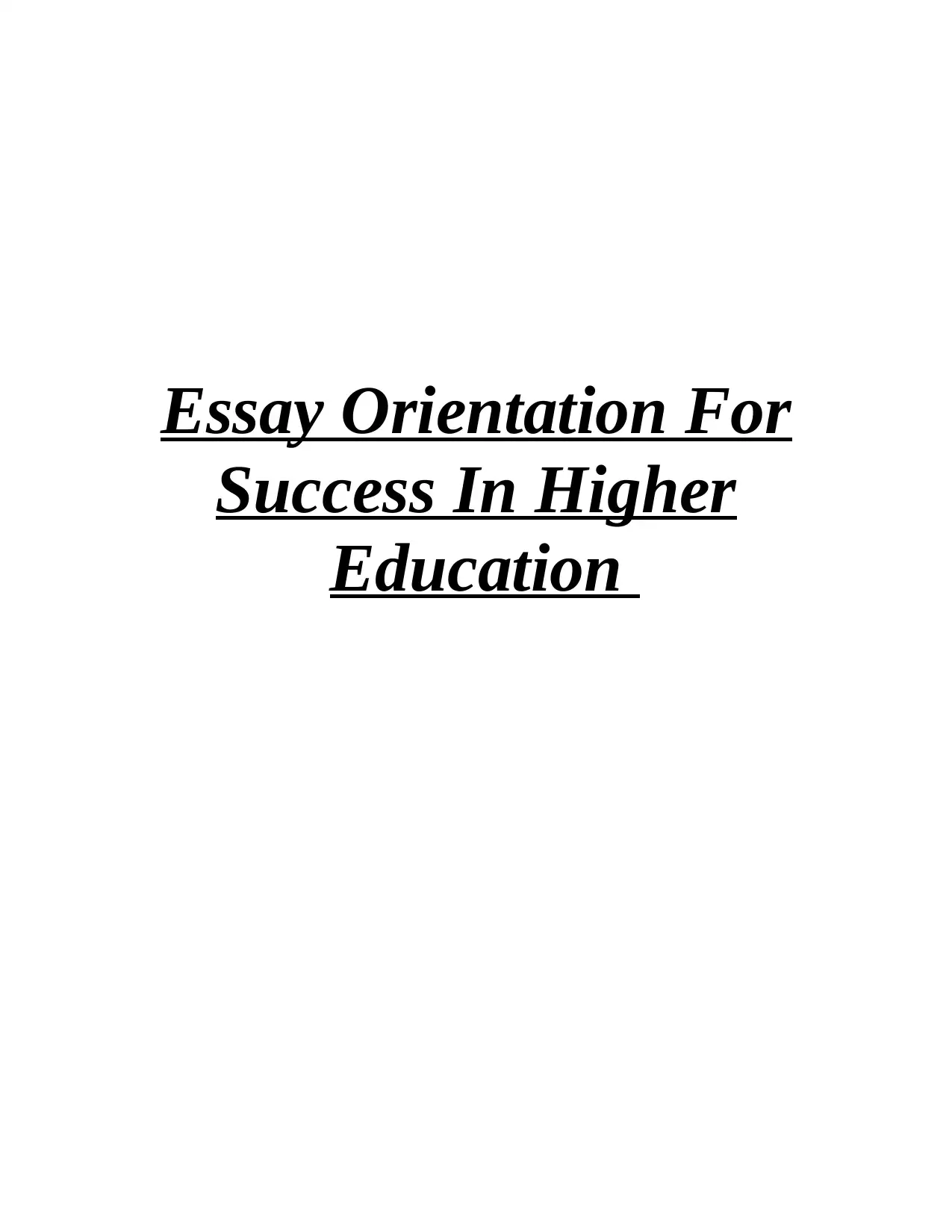
Essay Orientation For
Success In Higher
Education
Success In Higher
Education
Paraphrase This Document
Need a fresh take? Get an instant paraphrase of this document with our AI Paraphraser
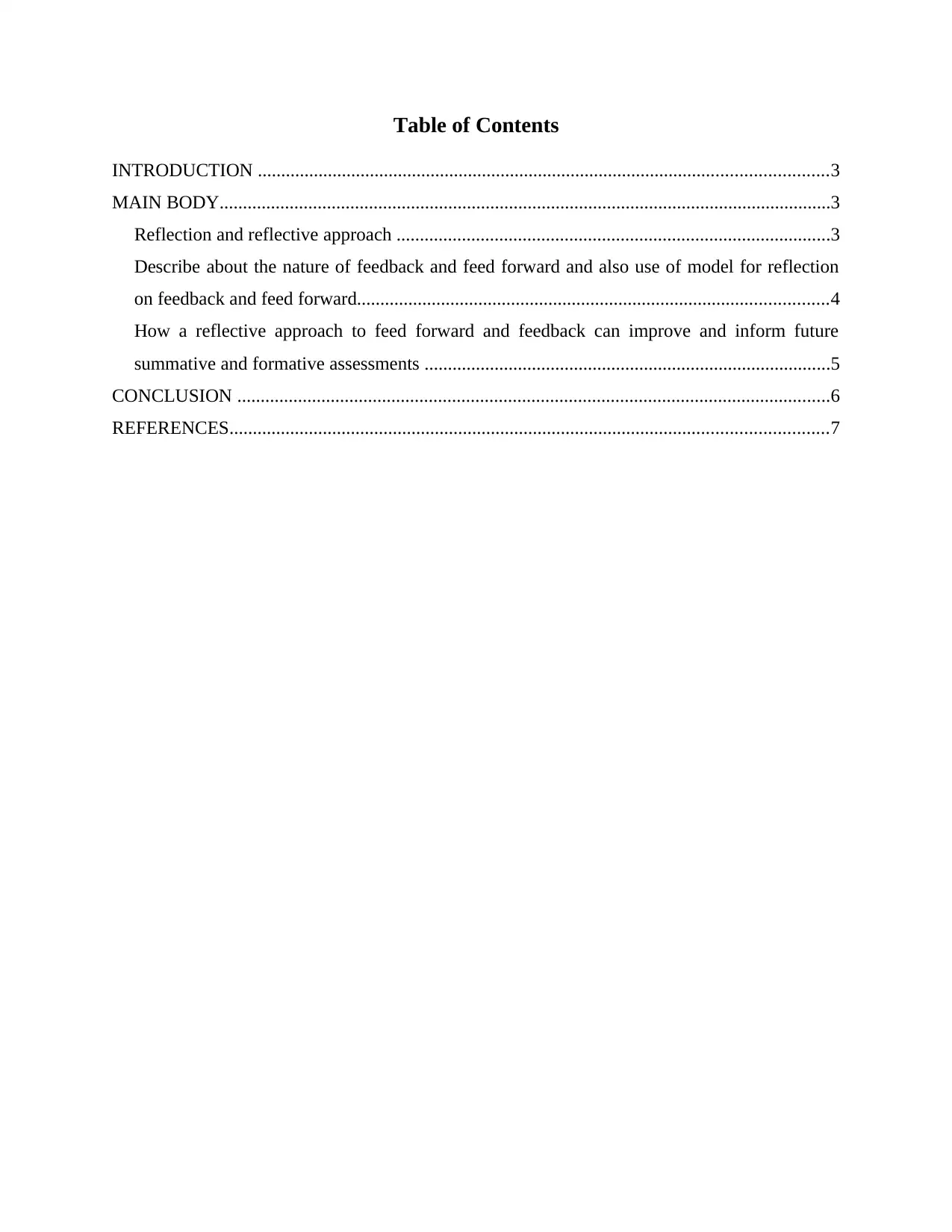
Table of Contents
INTRODUCTION ..........................................................................................................................3
MAIN BODY...................................................................................................................................3
Reflection and reflective approach .............................................................................................3
Describe about the nature of feedback and feed forward and also use of model for reflection
on feedback and feed forward.....................................................................................................4
How a reflective approach to feed forward and feedback can improve and inform future
summative and formative assessments .......................................................................................5
CONCLUSION ...............................................................................................................................6
REFERENCES................................................................................................................................7
INTRODUCTION ..........................................................................................................................3
MAIN BODY...................................................................................................................................3
Reflection and reflective approach .............................................................................................3
Describe about the nature of feedback and feed forward and also use of model for reflection
on feedback and feed forward.....................................................................................................4
How a reflective approach to feed forward and feedback can improve and inform future
summative and formative assessments .......................................................................................5
CONCLUSION ...............................................................................................................................6
REFERENCES................................................................................................................................7
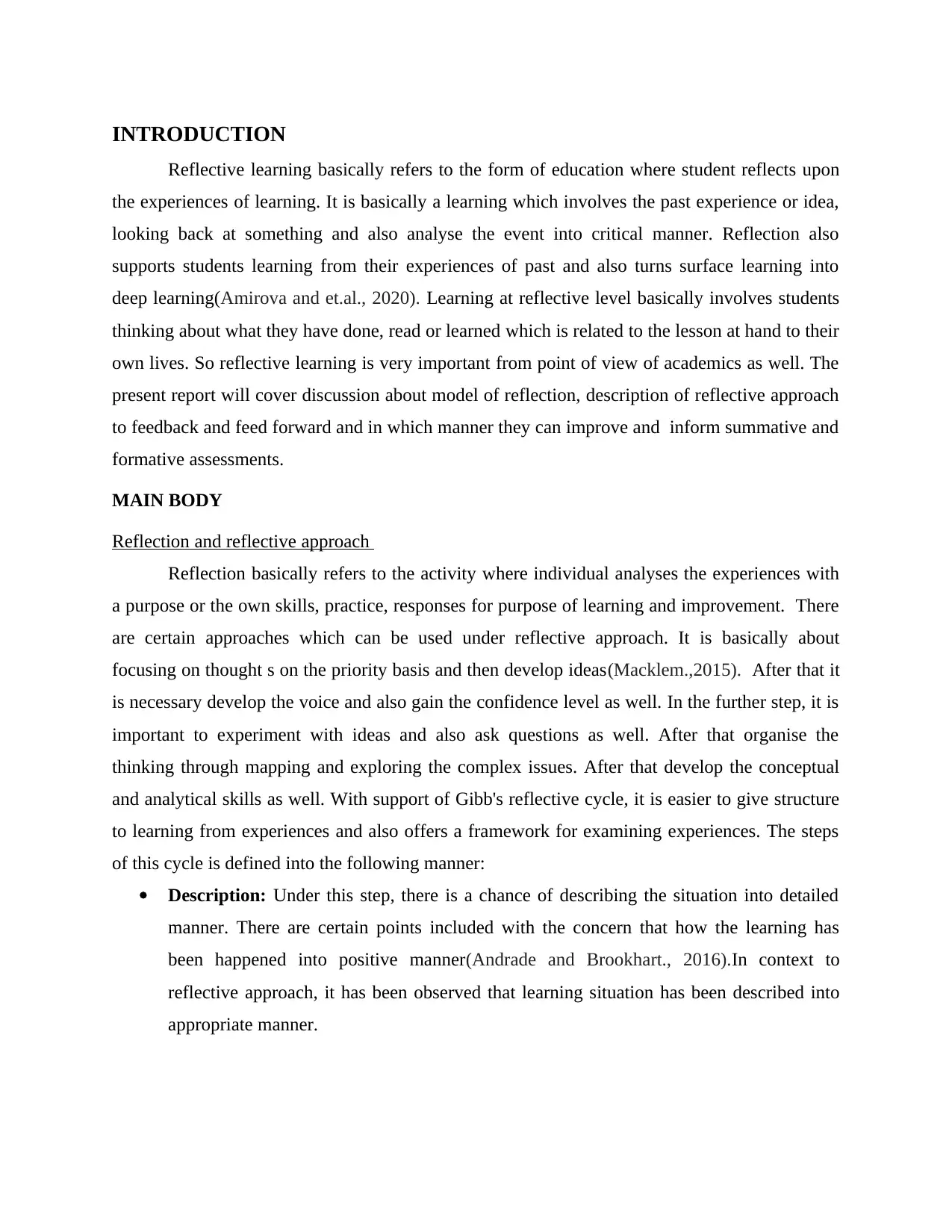
INTRODUCTION
Reflective learning basically refers to the form of education where student reflects upon
the experiences of learning. It is basically a learning which involves the past experience or idea,
looking back at something and also analyse the event into critical manner. Reflection also
supports students learning from their experiences of past and also turns surface learning into
deep learning(Amirova and et.al., 2020). Learning at reflective level basically involves students
thinking about what they have done, read or learned which is related to the lesson at hand to their
own lives. So reflective learning is very important from point of view of academics as well. The
present report will cover discussion about model of reflection, description of reflective approach
to feedback and feed forward and in which manner they can improve and inform summative and
formative assessments.
MAIN BODY
Reflection and reflective approach
Reflection basically refers to the activity where individual analyses the experiences with
a purpose or the own skills, practice, responses for purpose of learning and improvement. There
are certain approaches which can be used under reflective approach. It is basically about
focusing on thought s on the priority basis and then develop ideas(Macklem.,2015). After that it
is necessary develop the voice and also gain the confidence level as well. In the further step, it is
important to experiment with ideas and also ask questions as well. After that organise the
thinking through mapping and exploring the complex issues. After that develop the conceptual
and analytical skills as well. With support of Gibb's reflective cycle, it is easier to give structure
to learning from experiences and also offers a framework for examining experiences. The steps
of this cycle is defined into the following manner:
Description: Under this step, there is a chance of describing the situation into detailed
manner. There are certain points included with the concern that how the learning has
been happened into positive manner(Andrade and Brookhart., 2016).In context to
reflective approach, it has been observed that learning situation has been described into
appropriate manner.
Reflective learning basically refers to the form of education where student reflects upon
the experiences of learning. It is basically a learning which involves the past experience or idea,
looking back at something and also analyse the event into critical manner. Reflection also
supports students learning from their experiences of past and also turns surface learning into
deep learning(Amirova and et.al., 2020). Learning at reflective level basically involves students
thinking about what they have done, read or learned which is related to the lesson at hand to their
own lives. So reflective learning is very important from point of view of academics as well. The
present report will cover discussion about model of reflection, description of reflective approach
to feedback and feed forward and in which manner they can improve and inform summative and
formative assessments.
MAIN BODY
Reflection and reflective approach
Reflection basically refers to the activity where individual analyses the experiences with
a purpose or the own skills, practice, responses for purpose of learning and improvement. There
are certain approaches which can be used under reflective approach. It is basically about
focusing on thought s on the priority basis and then develop ideas(Macklem.,2015). After that it
is necessary develop the voice and also gain the confidence level as well. In the further step, it is
important to experiment with ideas and also ask questions as well. After that organise the
thinking through mapping and exploring the complex issues. After that develop the conceptual
and analytical skills as well. With support of Gibb's reflective cycle, it is easier to give structure
to learning from experiences and also offers a framework for examining experiences. The steps
of this cycle is defined into the following manner:
Description: Under this step, there is a chance of describing the situation into detailed
manner. There are certain points included with the concern that how the learning has
been happened into positive manner(Andrade and Brookhart., 2016).In context to
reflective approach, it has been observed that learning situation has been described into
appropriate manner.
⊘ This is a preview!⊘
Do you want full access?
Subscribe today to unlock all pages.

Trusted by 1+ million students worldwide
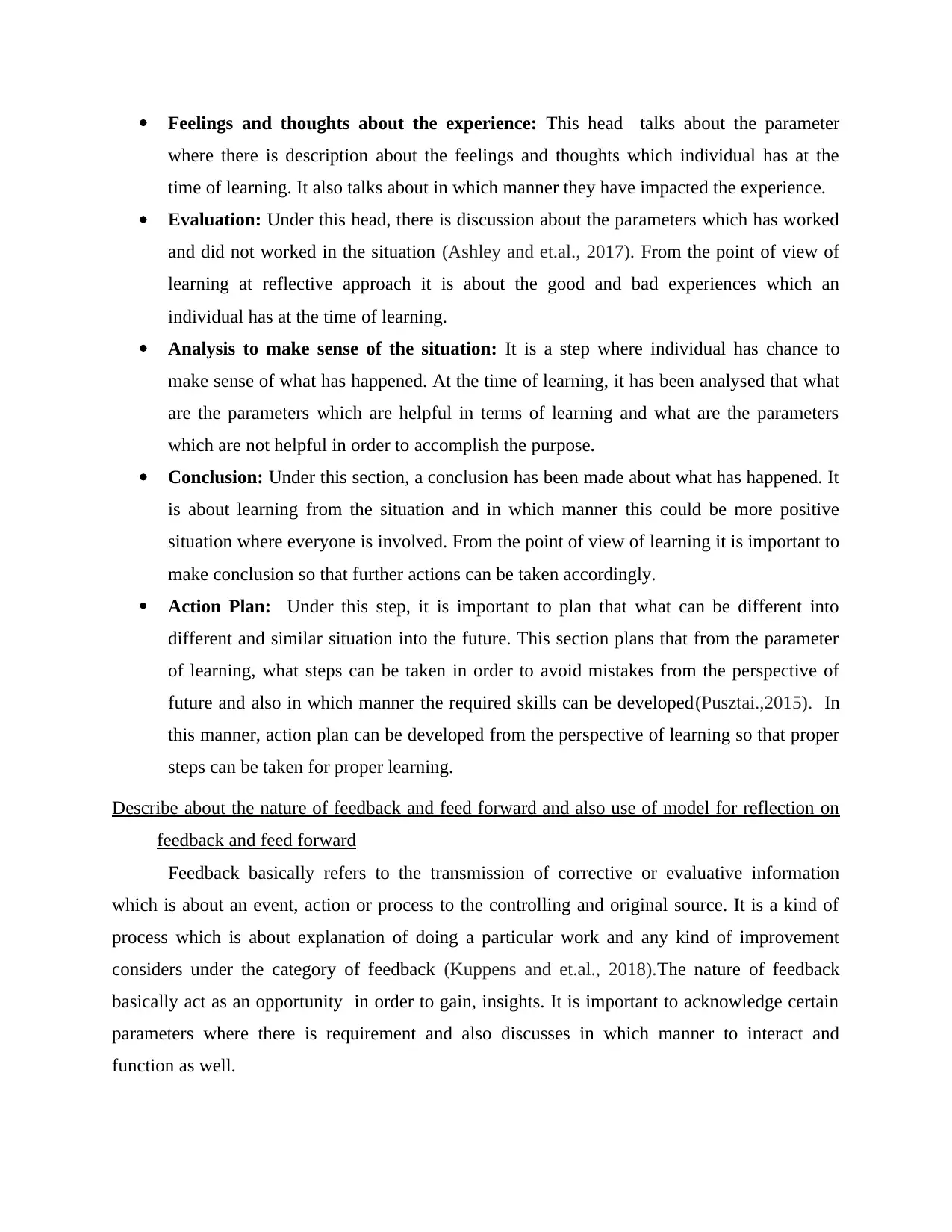
Feelings and thoughts about the experience: This head talks about the parameter
where there is description about the feelings and thoughts which individual has at the
time of learning. It also talks about in which manner they have impacted the experience.
Evaluation: Under this head, there is discussion about the parameters which has worked
and did not worked in the situation (Ashley and et.al., 2017). From the point of view of
learning at reflective approach it is about the good and bad experiences which an
individual has at the time of learning.
Analysis to make sense of the situation: It is a step where individual has chance to
make sense of what has happened. At the time of learning, it has been analysed that what
are the parameters which are helpful in terms of learning and what are the parameters
which are not helpful in order to accomplish the purpose.
Conclusion: Under this section, a conclusion has been made about what has happened. It
is about learning from the situation and in which manner this could be more positive
situation where everyone is involved. From the point of view of learning it is important to
make conclusion so that further actions can be taken accordingly.
Action Plan: Under this step, it is important to plan that what can be different into
different and similar situation into the future. This section plans that from the parameter
of learning, what steps can be taken in order to avoid mistakes from the perspective of
future and also in which manner the required skills can be developed(Pusztai.,2015). In
this manner, action plan can be developed from the perspective of learning so that proper
steps can be taken for proper learning.
Describe about the nature of feedback and feed forward and also use of model for reflection on
feedback and feed forward
Feedback basically refers to the transmission of corrective or evaluative information
which is about an event, action or process to the controlling and original source. It is a kind of
process which is about explanation of doing a particular work and any kind of improvement
considers under the category of feedback (Kuppens and et.al., 2018).The nature of feedback
basically act as an opportunity in order to gain, insights. It is important to acknowledge certain
parameters where there is requirement and also discusses in which manner to interact and
function as well.
where there is description about the feelings and thoughts which individual has at the
time of learning. It also talks about in which manner they have impacted the experience.
Evaluation: Under this head, there is discussion about the parameters which has worked
and did not worked in the situation (Ashley and et.al., 2017). From the point of view of
learning at reflective approach it is about the good and bad experiences which an
individual has at the time of learning.
Analysis to make sense of the situation: It is a step where individual has chance to
make sense of what has happened. At the time of learning, it has been analysed that what
are the parameters which are helpful in terms of learning and what are the parameters
which are not helpful in order to accomplish the purpose.
Conclusion: Under this section, a conclusion has been made about what has happened. It
is about learning from the situation and in which manner this could be more positive
situation where everyone is involved. From the point of view of learning it is important to
make conclusion so that further actions can be taken accordingly.
Action Plan: Under this step, it is important to plan that what can be different into
different and similar situation into the future. This section plans that from the parameter
of learning, what steps can be taken in order to avoid mistakes from the perspective of
future and also in which manner the required skills can be developed(Pusztai.,2015). In
this manner, action plan can be developed from the perspective of learning so that proper
steps can be taken for proper learning.
Describe about the nature of feedback and feed forward and also use of model for reflection on
feedback and feed forward
Feedback basically refers to the transmission of corrective or evaluative information
which is about an event, action or process to the controlling and original source. It is a kind of
process which is about explanation of doing a particular work and any kind of improvement
considers under the category of feedback (Kuppens and et.al., 2018).The nature of feedback
basically act as an opportunity in order to gain, insights. It is important to acknowledge certain
parameters where there is requirement and also discusses in which manner to interact and
function as well.
Paraphrase This Document
Need a fresh take? Get an instant paraphrase of this document with our AI Paraphraser
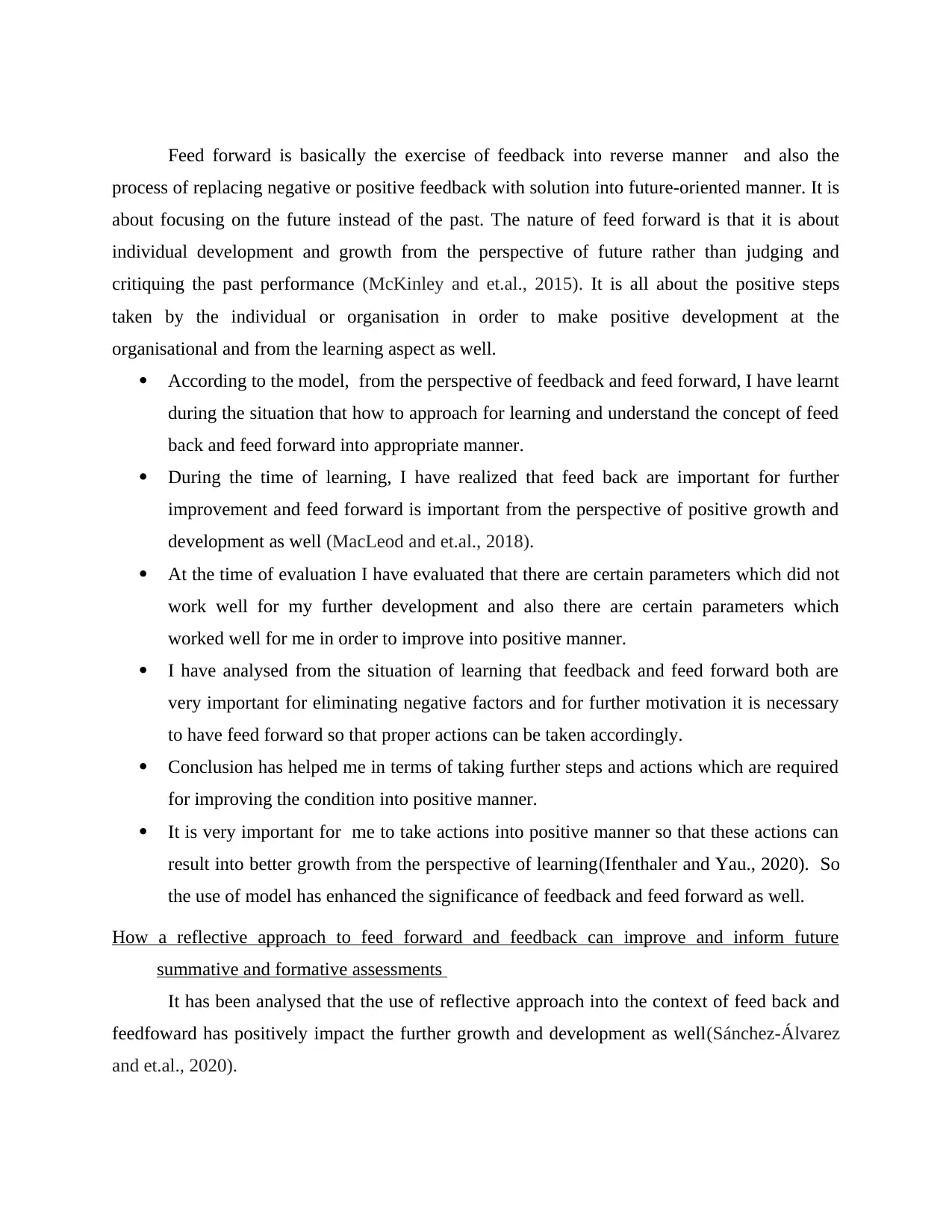
Feed forward is basically the exercise of feedback into reverse manner and also the
process of replacing negative or positive feedback with solution into future-oriented manner. It is
about focusing on the future instead of the past. The nature of feed forward is that it is about
individual development and growth from the perspective of future rather than judging and
critiquing the past performance (McKinley and et.al., 2015). It is all about the positive steps
taken by the individual or organisation in order to make positive development at the
organisational and from the learning aspect as well.
According to the model, from the perspective of feedback and feed forward, I have learnt
during the situation that how to approach for learning and understand the concept of feed
back and feed forward into appropriate manner.
During the time of learning, I have realized that feed back are important for further
improvement and feed forward is important from the perspective of positive growth and
development as well (MacLeod and et.al., 2018).
At the time of evaluation I have evaluated that there are certain parameters which did not
work well for my further development and also there are certain parameters which
worked well for me in order to improve into positive manner.
I have analysed from the situation of learning that feedback and feed forward both are
very important for eliminating negative factors and for further motivation it is necessary
to have feed forward so that proper actions can be taken accordingly.
Conclusion has helped me in terms of taking further steps and actions which are required
for improving the condition into positive manner.
It is very important for me to take actions into positive manner so that these actions can
result into better growth from the perspective of learning(Ifenthaler and Yau., 2020). So
the use of model has enhanced the significance of feedback and feed forward as well.
How a reflective approach to feed forward and feedback can improve and inform future
summative and formative assessments
It has been analysed that the use of reflective approach into the context of feed back and
feedfoward has positively impact the further growth and development as well(Sánchez-Álvarez
and et.al., 2020).
process of replacing negative or positive feedback with solution into future-oriented manner. It is
about focusing on the future instead of the past. The nature of feed forward is that it is about
individual development and growth from the perspective of future rather than judging and
critiquing the past performance (McKinley and et.al., 2015). It is all about the positive steps
taken by the individual or organisation in order to make positive development at the
organisational and from the learning aspect as well.
According to the model, from the perspective of feedback and feed forward, I have learnt
during the situation that how to approach for learning and understand the concept of feed
back and feed forward into appropriate manner.
During the time of learning, I have realized that feed back are important for further
improvement and feed forward is important from the perspective of positive growth and
development as well (MacLeod and et.al., 2018).
At the time of evaluation I have evaluated that there are certain parameters which did not
work well for my further development and also there are certain parameters which
worked well for me in order to improve into positive manner.
I have analysed from the situation of learning that feedback and feed forward both are
very important for eliminating negative factors and for further motivation it is necessary
to have feed forward so that proper actions can be taken accordingly.
Conclusion has helped me in terms of taking further steps and actions which are required
for improving the condition into positive manner.
It is very important for me to take actions into positive manner so that these actions can
result into better growth from the perspective of learning(Ifenthaler and Yau., 2020). So
the use of model has enhanced the significance of feedback and feed forward as well.
How a reflective approach to feed forward and feedback can improve and inform future
summative and formative assessments
It has been analysed that the use of reflective approach into the context of feed back and
feedfoward has positively impact the further growth and development as well(Sánchez-Álvarez
and et.al., 2020).
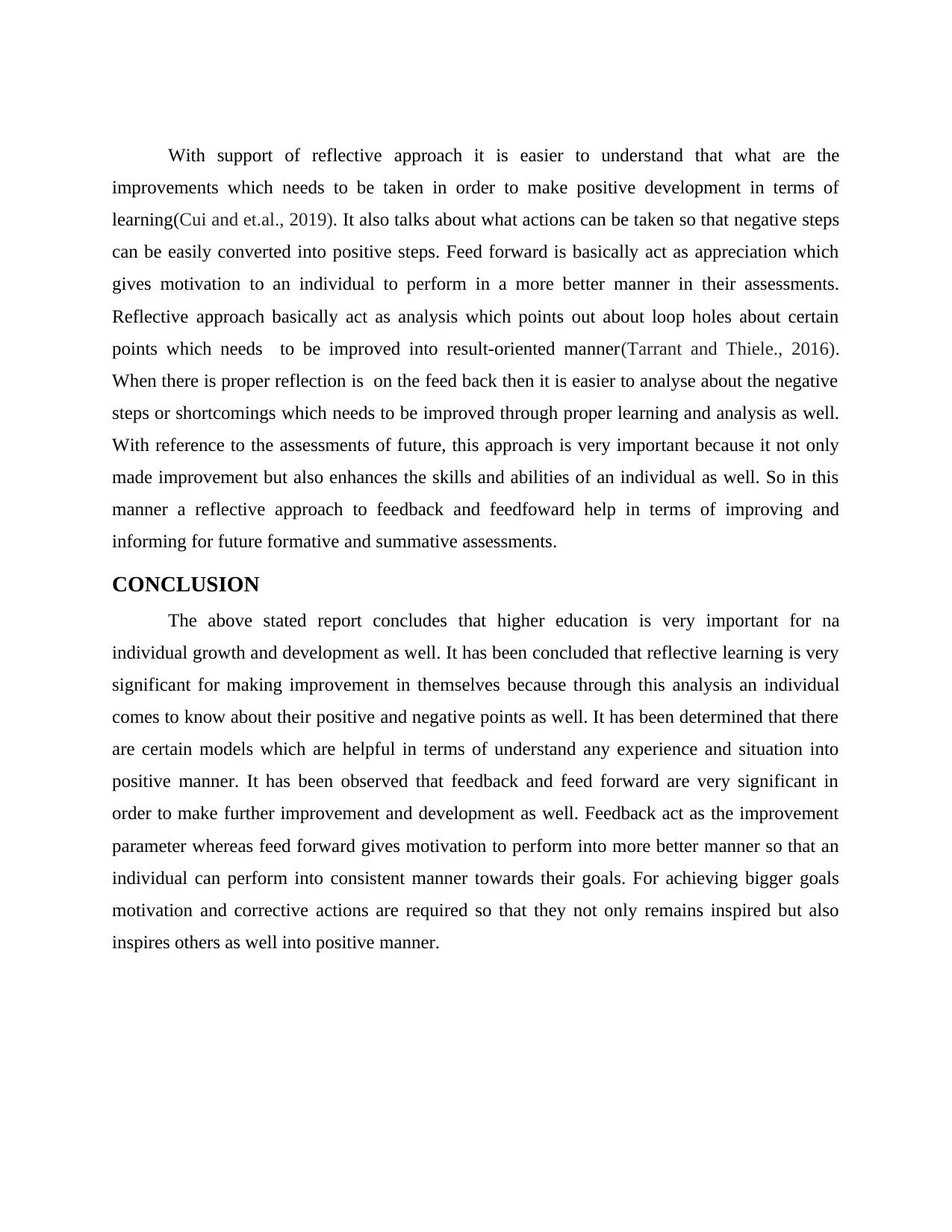
With support of reflective approach it is easier to understand that what are the
improvements which needs to be taken in order to make positive development in terms of
learning(Cui and et.al., 2019). It also talks about what actions can be taken so that negative steps
can be easily converted into positive steps. Feed forward is basically act as appreciation which
gives motivation to an individual to perform in a more better manner in their assessments.
Reflective approach basically act as analysis which points out about loop holes about certain
points which needs to be improved into result-oriented manner(Tarrant and Thiele., 2016).
When there is proper reflection is on the feed back then it is easier to analyse about the negative
steps or shortcomings which needs to be improved through proper learning and analysis as well.
With reference to the assessments of future, this approach is very important because it not only
made improvement but also enhances the skills and abilities of an individual as well. So in this
manner a reflective approach to feedback and feedfoward help in terms of improving and
informing for future formative and summative assessments.
CONCLUSION
The above stated report concludes that higher education is very important for na
individual growth and development as well. It has been concluded that reflective learning is very
significant for making improvement in themselves because through this analysis an individual
comes to know about their positive and negative points as well. It has been determined that there
are certain models which are helpful in terms of understand any experience and situation into
positive manner. It has been observed that feedback and feed forward are very significant in
order to make further improvement and development as well. Feedback act as the improvement
parameter whereas feed forward gives motivation to perform into more better manner so that an
individual can perform into consistent manner towards their goals. For achieving bigger goals
motivation and corrective actions are required so that they not only remains inspired but also
inspires others as well into positive manner.
improvements which needs to be taken in order to make positive development in terms of
learning(Cui and et.al., 2019). It also talks about what actions can be taken so that negative steps
can be easily converted into positive steps. Feed forward is basically act as appreciation which
gives motivation to an individual to perform in a more better manner in their assessments.
Reflective approach basically act as analysis which points out about loop holes about certain
points which needs to be improved into result-oriented manner(Tarrant and Thiele., 2016).
When there is proper reflection is on the feed back then it is easier to analyse about the negative
steps or shortcomings which needs to be improved through proper learning and analysis as well.
With reference to the assessments of future, this approach is very important because it not only
made improvement but also enhances the skills and abilities of an individual as well. So in this
manner a reflective approach to feedback and feedfoward help in terms of improving and
informing for future formative and summative assessments.
CONCLUSION
The above stated report concludes that higher education is very important for na
individual growth and development as well. It has been concluded that reflective learning is very
significant for making improvement in themselves because through this analysis an individual
comes to know about their positive and negative points as well. It has been determined that there
are certain models which are helpful in terms of understand any experience and situation into
positive manner. It has been observed that feedback and feed forward are very significant in
order to make further improvement and development as well. Feedback act as the improvement
parameter whereas feed forward gives motivation to perform into more better manner so that an
individual can perform into consistent manner towards their goals. For achieving bigger goals
motivation and corrective actions are required so that they not only remains inspired but also
inspires others as well into positive manner.
⊘ This is a preview!⊘
Do you want full access?
Subscribe today to unlock all pages.

Trusted by 1+ million students worldwide
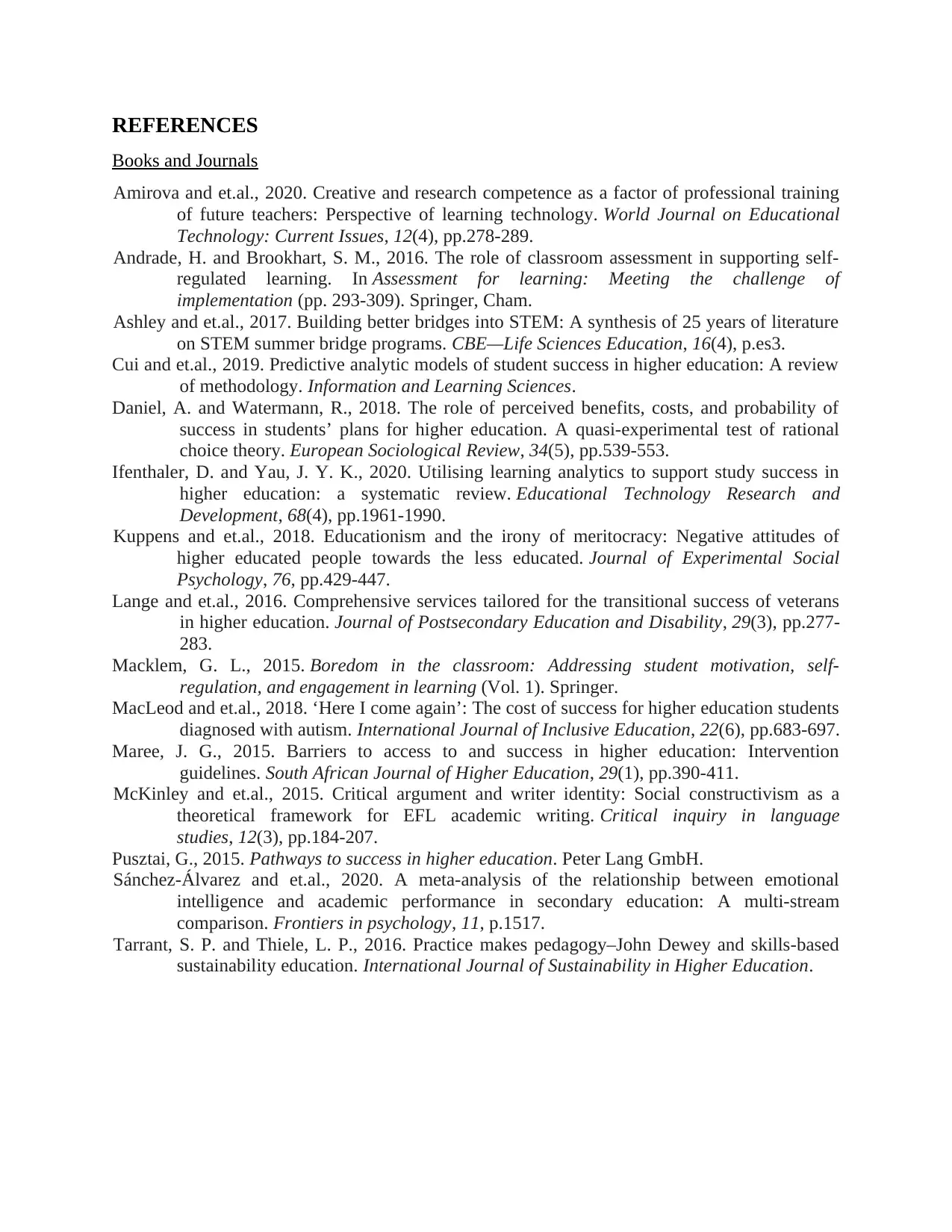
REFERENCES
Books and Journals
Amirova and et.al., 2020. Creative and research competence as a factor of professional training
of future teachers: Perspective of learning technology. World Journal on Educational
Technology: Current Issues, 12(4), pp.278-289.
Andrade, H. and Brookhart, S. M., 2016. The role of classroom assessment in supporting self-
regulated learning. In Assessment for learning: Meeting the challenge of
implementation (pp. 293-309). Springer, Cham.
Ashley and et.al., 2017. Building better bridges into STEM: A synthesis of 25 years of literature
on STEM summer bridge programs. CBE—Life Sciences Education, 16(4), p.es3.
Cui and et.al., 2019. Predictive analytic models of student success in higher education: A review
of methodology. Information and Learning Sciences.
Daniel, A. and Watermann, R., 2018. The role of perceived benefits, costs, and probability of
success in students’ plans for higher education. A quasi-experimental test of rational
choice theory. European Sociological Review, 34(5), pp.539-553.
Ifenthaler, D. and Yau, J. Y. K., 2020. Utilising learning analytics to support study success in
higher education: a systematic review. Educational Technology Research and
Development, 68(4), pp.1961-1990.
Kuppens and et.al., 2018. Educationism and the irony of meritocracy: Negative attitudes of
higher educated people towards the less educated. Journal of Experimental Social
Psychology, 76, pp.429-447.
Lange and et.al., 2016. Comprehensive services tailored for the transitional success of veterans
in higher education. Journal of Postsecondary Education and Disability, 29(3), pp.277-
283.
Macklem, G. L., 2015. Boredom in the classroom: Addressing student motivation, self-
regulation, and engagement in learning (Vol. 1). Springer.
MacLeod and et.al., 2018. ‘Here I come again’: The cost of success for higher education students
diagnosed with autism. International Journal of Inclusive Education, 22(6), pp.683-697.
Maree, J. G., 2015. Barriers to access to and success in higher education: Intervention
guidelines. South African Journal of Higher Education, 29(1), pp.390-411.
McKinley and et.al., 2015. Critical argument and writer identity: Social constructivism as a
theoretical framework for EFL academic writing. Critical inquiry in language
studies, 12(3), pp.184-207.
Pusztai, G., 2015. Pathways to success in higher education. Peter Lang GmbH.
Sánchez-Álvarez and et.al., 2020. A meta-analysis of the relationship between emotional
intelligence and academic performance in secondary education: A multi-stream
comparison. Frontiers in psychology, 11, p.1517.
Tarrant, S. P. and Thiele, L. P., 2016. Practice makes pedagogy–John Dewey and skills-based
sustainability education. International Journal of Sustainability in Higher Education.
Books and Journals
Amirova and et.al., 2020. Creative and research competence as a factor of professional training
of future teachers: Perspective of learning technology. World Journal on Educational
Technology: Current Issues, 12(4), pp.278-289.
Andrade, H. and Brookhart, S. M., 2016. The role of classroom assessment in supporting self-
regulated learning. In Assessment for learning: Meeting the challenge of
implementation (pp. 293-309). Springer, Cham.
Ashley and et.al., 2017. Building better bridges into STEM: A synthesis of 25 years of literature
on STEM summer bridge programs. CBE—Life Sciences Education, 16(4), p.es3.
Cui and et.al., 2019. Predictive analytic models of student success in higher education: A review
of methodology. Information and Learning Sciences.
Daniel, A. and Watermann, R., 2018. The role of perceived benefits, costs, and probability of
success in students’ plans for higher education. A quasi-experimental test of rational
choice theory. European Sociological Review, 34(5), pp.539-553.
Ifenthaler, D. and Yau, J. Y. K., 2020. Utilising learning analytics to support study success in
higher education: a systematic review. Educational Technology Research and
Development, 68(4), pp.1961-1990.
Kuppens and et.al., 2018. Educationism and the irony of meritocracy: Negative attitudes of
higher educated people towards the less educated. Journal of Experimental Social
Psychology, 76, pp.429-447.
Lange and et.al., 2016. Comprehensive services tailored for the transitional success of veterans
in higher education. Journal of Postsecondary Education and Disability, 29(3), pp.277-
283.
Macklem, G. L., 2015. Boredom in the classroom: Addressing student motivation, self-
regulation, and engagement in learning (Vol. 1). Springer.
MacLeod and et.al., 2018. ‘Here I come again’: The cost of success for higher education students
diagnosed with autism. International Journal of Inclusive Education, 22(6), pp.683-697.
Maree, J. G., 2015. Barriers to access to and success in higher education: Intervention
guidelines. South African Journal of Higher Education, 29(1), pp.390-411.
McKinley and et.al., 2015. Critical argument and writer identity: Social constructivism as a
theoretical framework for EFL academic writing. Critical inquiry in language
studies, 12(3), pp.184-207.
Pusztai, G., 2015. Pathways to success in higher education. Peter Lang GmbH.
Sánchez-Álvarez and et.al., 2020. A meta-analysis of the relationship between emotional
intelligence and academic performance in secondary education: A multi-stream
comparison. Frontiers in psychology, 11, p.1517.
Tarrant, S. P. and Thiele, L. P., 2016. Practice makes pedagogy–John Dewey and skills-based
sustainability education. International Journal of Sustainability in Higher Education.
Paraphrase This Document
Need a fresh take? Get an instant paraphrase of this document with our AI Paraphraser


⊘ This is a preview!⊘
Do you want full access?
Subscribe today to unlock all pages.

Trusted by 1+ million students worldwide
1 out of 9
Related Documents
Your All-in-One AI-Powered Toolkit for Academic Success.
+13062052269
info@desklib.com
Available 24*7 on WhatsApp / Email
![[object Object]](/_next/static/media/star-bottom.7253800d.svg)
Unlock your academic potential
Copyright © 2020–2026 A2Z Services. All Rights Reserved. Developed and managed by ZUCOL.



